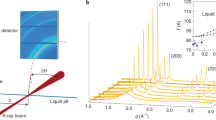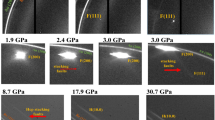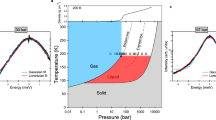Abstract
MEASUREMENTS of the properties of condensed solutions of the inert gases should prove important in the development of the theory of solutions because of the comparatively simple nature of the interatomic forces. While, from the theoretical point of view, equilibrium diagrams are complicated in that they necessarily contain information concerning two or more forms of solution, their determination is a most useful initial step in the examination of any system.
This is a preview of subscription content, access via your institution
Access options
Subscribe to this journal
Receive 51 print issues and online access
$199.00 per year
only $3.90 per issue
Buy this article
- Purchase on Springer Link
- Instant access to full article PDF
Prices may be subject to local taxes which are calculated during checkout
Similar content being viewed by others
References
Veith, H., and Schröder, E., Z. phys. Chem., A, 179, 16 (1937).
Domb, C., Nature, 175, 661 (1955).
Author information
Authors and Affiliations
Rights and permissions
About this article
Cite this article
HEASTIE, R. The Solid-Liquid Equilibrium Diagram of Argon and Krypton. Nature 176, 747–748 (1955). https://doi.org/10.1038/176747a0
Issue Date:
DOI: https://doi.org/10.1038/176747a0
This article is cited by
-
Solid solutions of argon and krypton
Il Nuovo Cimento (1958)
Comments
By submitting a comment you agree to abide by our Terms and Community Guidelines. If you find something abusive or that does not comply with our terms or guidelines please flag it as inappropriate.



